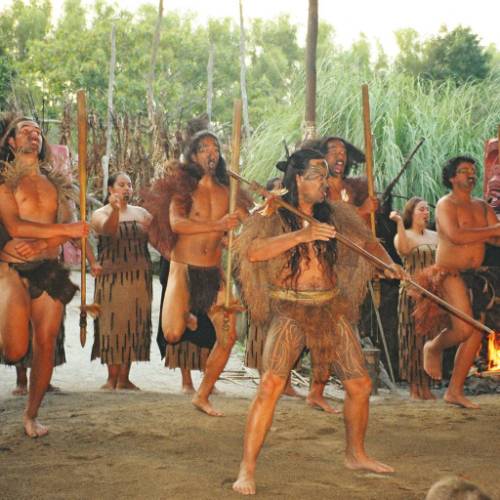New Zealand is famed for its rugged mountains, shimmering beaches and vibrant Maori culture. Uncover how indigenous Maori traditions contribute to New Zealand’s identity and protect its natural environment through one of our bookable, small group adventures!
Learning about another culture broadens your horizons and exposes you to new art forms, practices, and ways of connecting with the world. Discover how you can incorporate these ideas into your life and career through an ExpedNZ cultural immersion experience!
Maori Culture
Cultural Immersion in New Zealand gives students an immersive experience, engaging with local people and culture, learning their worldviews, beliefs, values and language.
Students will be encouraged to engage with the spiritual dimensions of the program through daily prayers led by students or tutors as well as visits from visiting clergy. This will build confidence when speaking Maori and enhance overall immersion.
Maori people are known for their ceremonial war dances known as Kapa Haka, which feature rhythmic foot stomping and chanting with vigorous physical motions to honor achievements or challenge competitors or pay respect at events like funerals. This dance can also serve to greet guests or pay respect at events like weddings.
Maori culture includes traditional food and crafts such as making poi and cooking in steaming earth ovens known as hangi. Traditional carvers keep Maori artforms alive by carving intricate works which tell stories and record history.
Maori people are deeply spiritual, believing that all aspects of nature are interdependent. This belief can be seen through their practice of tapu – where certain items or places are forbidden while other are sacred or forbidden – something Maori use for many different reasons and consider to be an extremely powerful force that must be respected and protected against. This can be seen when dealing with environmental matters, each other and visitors to their marae.
The Environment
Immersing oneself in another culture can take many forms: tasting new cuisine, celebrating annual festivities or accepting their way of life can all contribute. By immersing in another society’s arts, practices and traditions you can also gain an understanding of their perspective on life and society as a whole.
New Zealand is known for its stunning mountain, beach and forest landscapes that combine nature’s bounty with vibrant indigenous culture and history. Numerous cultural and natural areas have been designated UNESCO World Heritage Sites; Te Wahipounamu on South Island being one of the largest and most diverse ones encompassing glaciers, rainforest, mountains and beaches.
New Zealand’s cultural identity is formed through art. This includes everything from music, theatre and modern dance/ballet performances to opera and literature – with Wellington hosting its national opera company and New Zealand writers seeking to establish their own national literary tradition, while heavily influenced by English writers such as T.S. Eliot and W.H. Davies.
New Zealand is well known for its film industry, which has earned international acclaim through the work of directors such as Jane Campion and Peter Jackson whose Lord of the Rings trilogy was shot on location in North Island. New Zealand also has an advanced arts infrastructure with government support being given through funding and tax concessions for theatre, music, dance and film projects.
Maori Language
Te Reo Maori or Te Reo for short is an integral component of New Zealand’s indigenous culture and taught at all education levels from early childhood education (ECE) through to tertiary institutions. Students studying this immersive form known as Tikanga learn numbers, letters, songs, dances colors greetings blessings legends shared values while learning numbers letters songs dances colors greetings blessings legends legends shared values through both Maori and English languages.
Early 20th-century educational theory influenced by Western ideas about intelligence and child development reinforced the view that Maori children were intellectually inferior due to using an inflexible language code. Furthermore, use of intelligence tests (IQ/mental ability tests) reinforced this belief, along with perceptions that Maori children were retarded due to poor living conditions.
Maori people have recently made great strides to reassert their identity, with efforts underway to revive their language and revitalize culture and traditions. New groups have emerged that are dedicated to revitalizing Maori culture and tradition.
Traditional song and dance are an effective way of spreading Maori among young people and teaching them about its continued struggles against racism. On a recent cultural immersion trip with IFSA students visiting Maori villages for cultural immersion trips such as haka performances. At Skyline Gondola they attended a show featuring traditional song, dance and Maori mythology which gave the students an excellent opportunity to practice speaking their new language more fluently and gain confidence speaking a foreign language.
The People
Immersing oneself in another culture is an incredible opportunity to gain exposure to unfamiliar art forms, traditions, and ways of understanding our globalized world. You’ll gain insights into other people’s thought processes and connections within their communities as well as gain greater empathy for different perspectives in this globalized society.
Experiences offer us an opportunity to see how other cultures live and celebrate life differently; be it dancing, cooking traditional meals or participating in an annual festival. It may even encourage us to try something new like learning a sport or trying something we’ve wanted to try but were too afraid.
Maori were put under considerable pressure during colonization to assimilate, yet have returned with renewed energy to embrace their culture and embrace New Zealand as part of it. This resulted in a unique blend of Maori and Pakeha cultures becoming part of New Zealand, creating a uniquely beautiful Maori culture which now forms part of it.
Attending a Maori language immersion program allows you to experience this exciting fusion first-hand. Living alongside local kiwis and international students in university-provided housing, taking part in extracurricular activities to make friends, and joining excursions that bring you to exciting places throughout New Zealand will all offer invaluable experiences.
